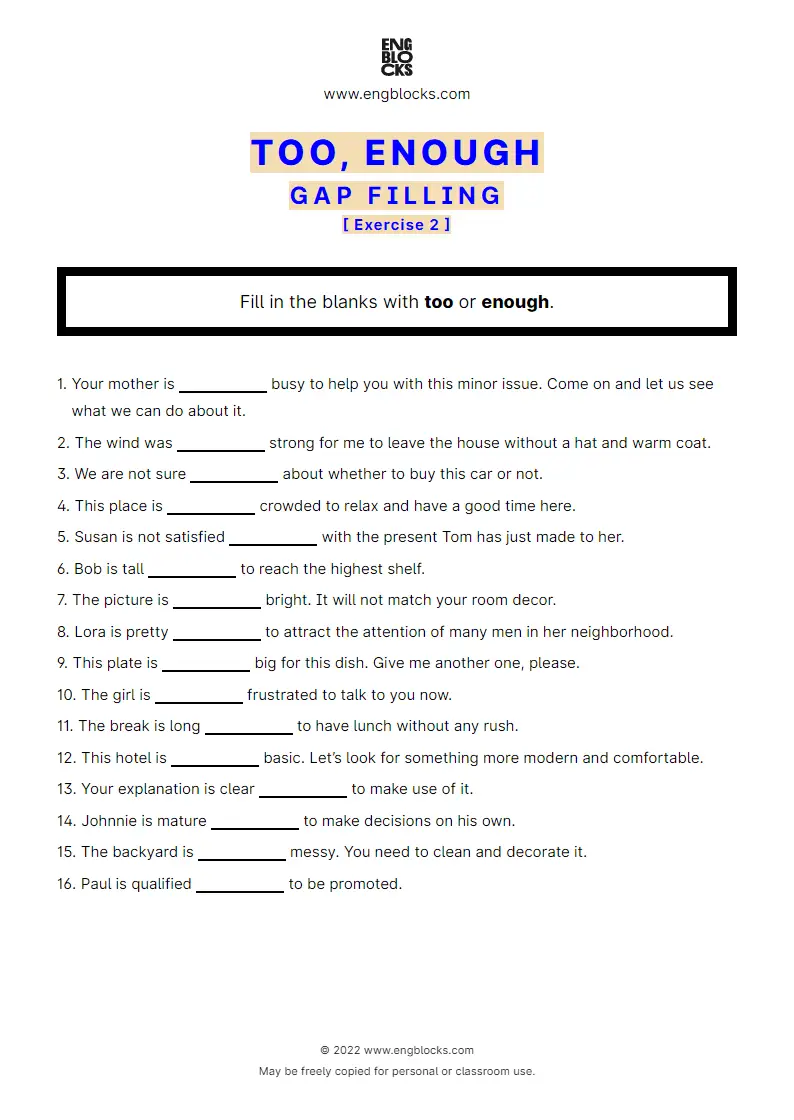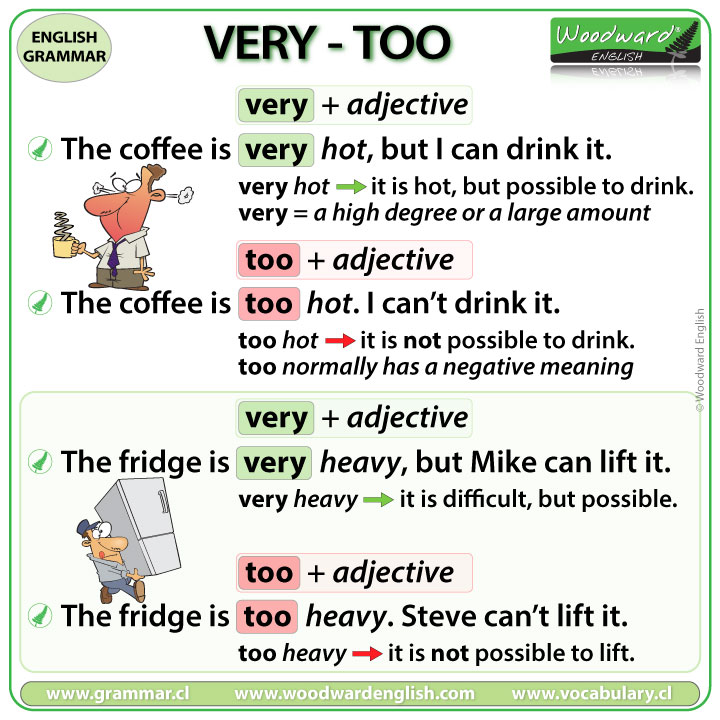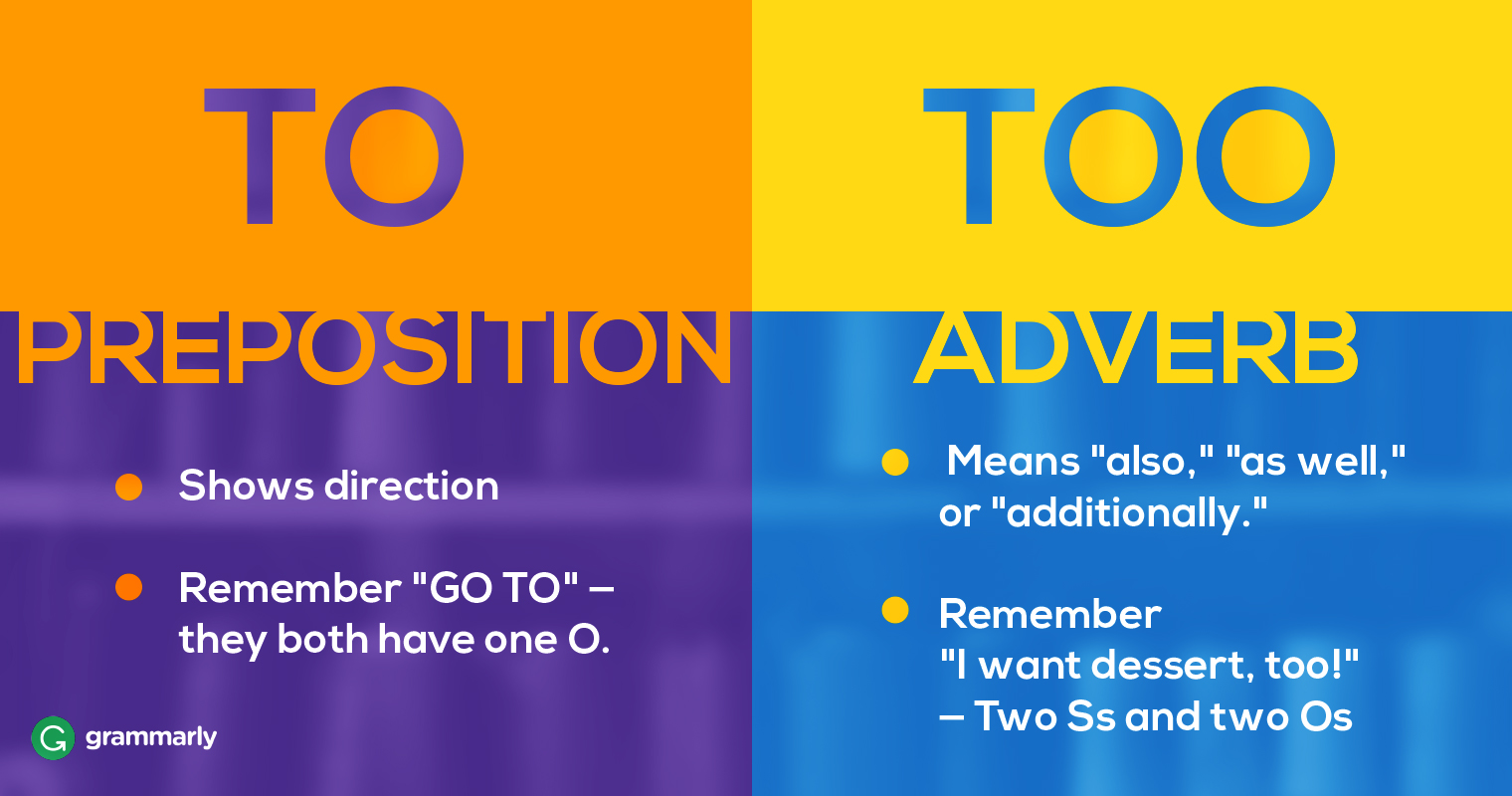
Too and Enough Gr8AmbitionZ
Definition of 'too' Word Frequency too adding something or responding (tuː ) 1. adverb You use too after mentioning another person, thing, or aspect that a previous statement applies to or includes. 'Nice to talk to you.'—'Nice to talk to you too.' 'I've got a great feeling about it.'—'Me too.' Depression may be expressed physically too.

too, too much, too many, enough Exercise 3 Worksheet English Grammar
Opinion: This cultural touchstone is killing far too many Americans. Opinion by Jill Filipovic. 6 minute read. Updated 2:53 PM EST, Thu January 4, 2024. The scene of a car crash on New Year's Day.

TOO vs ENOUGH vs VERY Useful Difference between Very, Too and Enough
- belonging (used before an object that belongs to, or is connected with something else). - The same preposition, "to", can be used as a synonym either for "before" in the context of telling time, placed in front of the hour when reading what time it is, or for "until", used before a particular time or state until something happens.

Too too on YouTube
When To Use To Vs. Too To Late Vs. Too Late Examples The words to, too, and two sound exactly alike but are used in completely different ways. They are classic examples of what we call homophones —words that are pronounced the same but have different meanings and spellings. Because they're so similar, they often get mixed up in written language.

Very vs. Too Woodward English
Too-too definition: excessively and tastelessly affected. See examples of TOO-TOO used in a sentence.

Too and Enough English grammar, Learn english words, Commonly
1 : besides, also sell the house and furniture too 2 a : to an excessive degree : excessively too large a house for us b : to such a degree as to be regrettable this time he has gone too far c : very didn't seem too interested 3 : so sense 2d "I didn't do it." "You did too ." Synonyms devilishly excessively exorbitantly inordinately intolerably

16+ I Too Grammar Images
In English writing, to is a preposition that expresses motion in the direction of . Too is an adverb meaning to a higher degree than is desirable, possible, or permissible. It also has another meaning in excess, in addition, or also. Two is a number that comes after one.

To vs. Too When to Use To or Too with Useful Examples Efortless English
Too is used when something is additional ("me, too!") or excessive ("too spicy"). Too is an adverb (a descriptive word that modifies another word, usually a verb). When pronounced properly, these words sound exactly the same!

Too, Too much, Too Many, (not) Enoug… English ESL worksheets pdf & doc
Too or To? What Is the Difference between "Too" and "To"? "Too" and "to" are easy to confuse because they sound identical. "Too" has two meanings: (1) "Too" means "as well." For example: Your eye is swollen. Your lip is swollen too. (2) "Too" conveys the idea of "in excess." For example: Your cat is too fat. "To" also has two meanings:

Too, Too much, Too Many, (not) Enoug… English ESL worksheets pdf & doc
from English Grammar Today Too is an adverb. Too meaning 'more than enough' We use too meaning 'more than enough' in different positions. Too before adjectives and adverbs We use too immediately before adjectives and adverbs: This coffee is too sweet. Not: This coffee is too much sweet. I can't sleep. It's too hot.

tootoo Word of the Day
English vocabulary "To" vs. "too" explained - The simple way to know which one to use To vs. too can be a common mix-up if English isn't your first language. Thankfully, there's an easy way to figure out which one is appropriate to use. Adam Volz Updated September 18, 2023 4 min read

Too Many Too Much Food Worksheets
There are too many roster losses to project a top-10 finish even after an inspiring run in 2023. Michael Penix Jr. and WR Rome Odunze are gone. It will be fascinating to watch Mississippi State.

Practice in English too much / too many / enough / too
A1 ( especially at the end of a sentence) in addition, also: I'd like to come too. informal "I love chocolate ." "Me too." used to show surprise: It's a wonderful picture of light shining through trees - and by a child too! Compare
too too YouTube
too something a something for someone/something It was too expensive a desk for a child's room. (all) too It's (all) too much (= more than I can deal with) - I can't stand it. all too used before an adjective or adverb to emphasize a negative meaning: The holidays flew by all too quickly. See more only too

Too, too many, too much, enough Baamboozle
Too is an adverb that can mean "excessively" or "also." Just to be clear: Two is also pronounced the same as to and too, but because it refers to a number, it's not as easy to confuse for one of the other words. In the hierarchy of things that drive grammar sticklers mad, to and too are near the top.

To vs. Too How Should You Use To and Too? Grammarly
Company Commas With "Too": When Do You Use Them? Grammarly Updated on January 14, 2021 Grammar You've likely read sentences in which there was a comma before and/or after the adverb too when it is used to mean "besides" or "also," but is this correct usage?